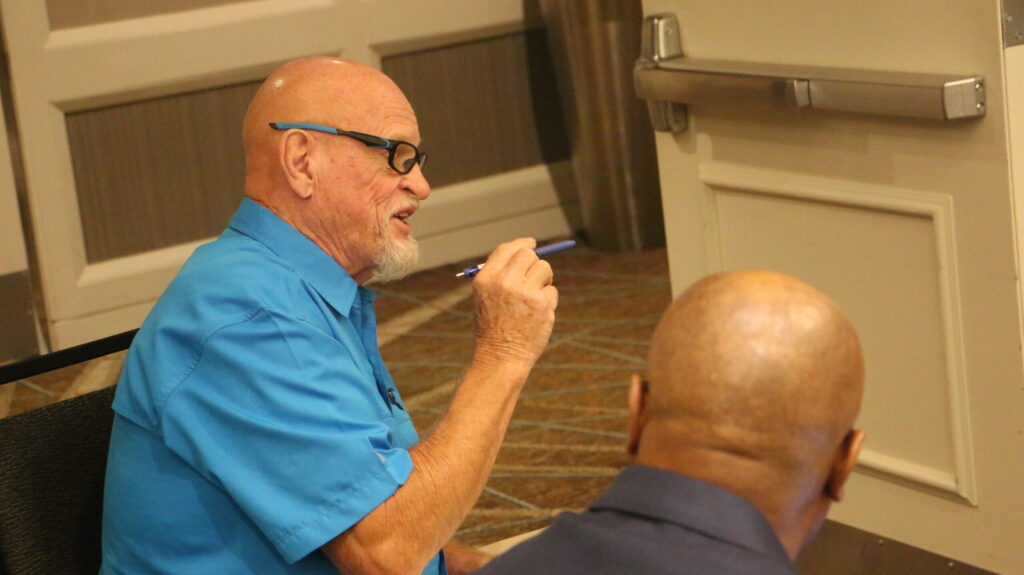February 2024 Megan Smith, PhD. University of North Carolina at Charlotte

If you are feeling lonely, you are not alone. A Harvard study reported in 2020 that about 45% of older adults feel lonely. There is a lot of talk about loneliness these days, but what exactly is loneliness? Loneliness is the subjective experience of a mismatch between the number of quality relationships you would like to have and the number of quality relationships you feel that you have. A quality relationship is often defined as one in which you can talk to that person about anything. Social isolation is the objective measure of how many people you interact with within a specified time. There is evidence that social isolation is high among older adults for a variety of reasons, ranging from decline or impairment of physical and mental health, lack of access to transportation, living alone, and lack of social support from family and friends in due a decrease in frequency of interactions. Solitude, according to research, is the luxury of choosing to be alone while also feeling socially connected.
Loneliness is subjective, meaning people experience loneliness differently. Some people feel connected with a small number of quality relationships in their lives; let’s say three as an example. However, if one friend moves away, losing that one person creates a feeling of loneliness because there is a mismatch between the number of desired relationships and actual ones. Other people need many quality relationships to feel socially connected; maybe needing 25 close relationships and if they only have 20, loneliness results. There are variations in loneliness thresholds.
In May 2023, the U.S. Surgeon General declared Loneliness “Our Epidemic.” The wording implies that we all have the responsibility to work on reducing our own loneliness, if we are experiencing it, and/or helping others move through this experience to become more socially connected. Loneliness is very problematic as it increases the onset of chronic physical and mental diseases as well as mortality rates. The alarming statistic often provided in terms of loneliness and its negative effect on health is that feeling lonely is akin to smoking 15 cigarettes a day.
Loneliness results in several negative consequences for our physical health. Loneliness increases the likelihood of hypertension, which can affect the likelihood of strokes. Research shows that lonely people are more likely to develop chronic heart disease, diabetes, and even some cancers. Loneliness also decreases the effectiveness of our immune system to ward off viruses. Loneliness is a contributor to mental health problems too. People who report feeling lonely are four times more likely to develop depression. Anxiety is the number one symptom of loneliness and increases the longer that one feels lonely. Many lonely people perceive a variety of social circumstances as anxiety provoking when they are socially disconnected, which does not occur when people feel socially connected. Loneliness also increases the likelihood of developing Alzheimer’s, other forms of dementia, and a variety of cognitive impairments.
One of the challenges though, is that many older adults may not initially think of loneliness as an explanation for feeling physically or mentally unwell. In the United States, we view health from a biomedical model, meaning our first thought is that there is a physical or biological issue causing health problems previously mentioned, but the overwhelming evidence consistently shows that loneliness contributes significantly to poor health.
Unfortunately, my motivation to study, publish, and talk about loneliness is based on personal experience. As a graduate student, I started spending a lot of time by myself reading and writing and spending time studying a group severely and persistently mentally ill people. I spent more time engaged in these activities as opposed to focusing on social connection. Prior to graduate school, I was gregarious and extroverted with many quality relationships. In short, I was quite socially connected. At some point during my PhD, I noticed changes in my behavior. I started to feel more anxious about my academic performance and perceived situations as anxiety provoking. I became critical of the quality of my own work. As the symptoms increased, my physical health simultaneously declined; I had migraines regularly, suffered from a host of digestive issues, and developed an autoimmune disorder. Doctors were unable to explain the symptoms as my lab was always “normal.” But there was a continuation of unusual behaviors. such as declining invitations even though I had no other plans, a common behavior of lonely people. I was not depressed, but I was not happy. I wondered if I was experiencing mental health problems. Despite proactive efforts to seek help, not a single doctor asked about my relationships with friends and family. Since I was not asked about my social connections, it never dawned on me that social disconnection was a root cause.
In 2018, by chance, I read a book titled “Lonely; A Memoir” by Elizabeth White. White shared her own experience with loneliness, her exploration into the current research (in 2011), and her unofficial qualitative research based on responses to her blog posts. It was the biggest “aha” moment– I realized my health issues over the years could easily be explained by being lonely. While it was difficult to accept the fact that I had personally made decisions leading to loneliness, the good news was that I could also get out of it.
Research suggests strategies to reduce loneliness in small steps. Small behavioral changes can make a significant difference over time. When we are lonely, we lose practice talking to people. Saying hello and asking about someone’s day such as a cashier, a neighbor, or a postal worker is a helpful starting point. The more practice with small talk, then research finds lonely people develop a comfort level to extend conversations. Joining a club or team- just one- such as bridge, pickleball, or a cigar club allows lonely people to interact more easily with others who have shared interests, birds of a feather flock together.
Dr. Vivek Murthy, the U.S. Surgeon General, claims that the most powerful antidote to loneliness is service to others. When we are lonely, we lose self-esteem and confidence. Helping others allows service to others and provides people with purpose and value. Identify ways that you can be of service, ranging from helping a neighbor to assisting local non-profits. These small changes and acts of service can end loneliness. One’s physical and mental health can improve significantly once social connection resumes. Loneliness is a challenging experience, no doubt, but please know that you are not alone and there are people willing to help and simple steps that can change how lonely one may feel.
As a researcher, professor, and public speaker on loneliness, I welcome the opportunity to speak to groups of individuals on this topic. Please feel free to contact me via email at ssmit392@charlotte.edu.


